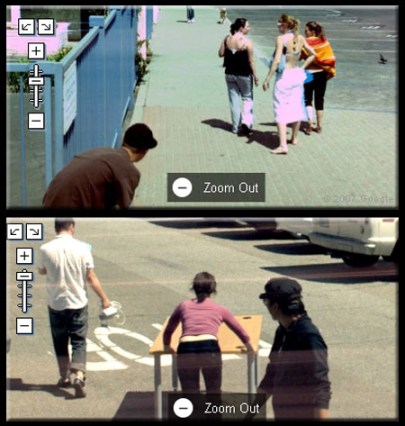
Google Inc.’s unstoppable drive to map and photograph the world has run into an immovable object — Switzerland’s strict tradition of personal privacy.
The country’s privacy watchdog announced Friday that he plans to haul the search engine company before a federal court to force it to make changes to its Street View application. Google criticized the decision and said it would defend itself in the case.
Street View allows Internet users to view panoramic street-level pictures of more than 100 cities around the world. It already has been criticized in several European countries and Japan for allowing individuals to be identified without their knowledge or consent — potentially exposing embarrassing facts about their private lives.
Switzerland’s federal data protection commissioner wants Google to ensure that all faces and car plates are blurred, remove pictures of enclosed areas such as walled gardens and private streets, and declare at least one week in advance which town and cities it plans to photograph and post online.
“Numerous faces and vehicle number plates are not made sufficiently unrecognizable from the point of view of data protection, especially where the persons concerned are shown in sensitive locations, e.g. outside hospitals, prisons or schools,” the commissioner, Hanspeter Thuer, said in a statement.
“The height from which the camera on top of the Google vehicle films is also problematic,” he said. “It provides a view over fences, hedges and walls, with the result that people see more on Street View than can been seen by a normal passer-by in the street.”
Thuer requested in August that Google take “various measures to protect personal privacy in its Street View online service.”
“Google for the most part declined to comply with the requests,” the commissioner said, prompting him to take the matter to Switzerland’s Federal Administrative Tribunal.
Google said it was disappointed by the move and would “vigorously contest” the case.
“We believe that Google Street View is absolutely legal, also in Switzerland,” said Matthias Meyer, a company spokesman.
Meyer said it was the first time Google has been sued because of the service, which he said was extremely popular in Switzerland, where tens of millions of images have been viewed since August. The California-based company has proposed five steps to allay Thuer’s concerns, and is planning to roll out a new version of its software that improves the blurring of faces and car plates.
“We’re trying to implement this new technology as fast as we can,” said Meyer. He was unable to say when the new version will be launched.
The case illustrates a clash of cultures between Switzerland’s legal system — which places a heavy emphasis on protecting privacy best illustrated by its strict banking secrecy laws — and the increasing use of new technology to gather and distribute information and pictures online.
“The Swiss are very concerned about protecting their basic rights,” said Nico Luchsinger, a Swiss writer specializing in technology issues.
“They tend to view attempts, including by the state, to interfere with or delve into their private lives with skepticism,” he said. “It’s not clear whether a majority of Swiss people object to Street View though.”
Other countries, too, have taken a dim view of Street View since its launch in 2007.
In July, Greek officials rejected a bid to photograph the nation’s streets until more privacy safeguards are provided. In April, residents of one English village formed a human chain to stop a camera van, and in Japan the company agreed to reshoot views taken by a camera high enough to peer over fences.
Google also caved in to German demands to erase the raw footage of faces, house numbers, license plates and individuals who have told authorities they do not want their information used in the service.
While Switzerland’s case may take months to wind its way through the nation’s legal system, it could have an immediate impact on the availability of the Street View service in the country. Thuer has asked the tribunal to require Google to remove all pictures taken in Switzerland and to cease taking any more pictures in the country until a ruling is made.
Editors' Recommendations
- Google just settled a $5B privacy suit involving Chrome browser
- DuckDuckGo calls out Google privacy update for ‘creepy advertising’
- Google to increase privacy online via its new Privacy Sandbox initiative


